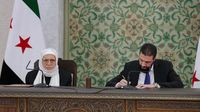Syria's interim president Ahmed al-Sharaa announced a significant milestone in the country's political landscape on Saturday, March 29, 2025, with the formation of a new transitional government. This development marks a crucial step away from decades of Assad family rule and aims to improve Syria's ties with the West.
In a speech delivered during the announcement, al-Sharaa expressed his commitment to "building a strong and stable state." The new cabinet consists of 23 ministers, reflecting a diverse representation of Syria's various ethnic and religious communities. Notably, Foreign Minister Asaad al-Shaibani and Defence Minister Murhaf Abu Qasra will retain their positions, ensuring continuity in key areas of governance.
Among the new appointments, Anas Khattab has been named interior minister, while Mohammed Yosr Bernieh has taken on the role of finance minister. In a historic move, veteran opposition figure Hind Kabawat has been appointed as the social affairs and labour minister, becoming the first woman to hold a ministerial position under al-Sharaa's administration. Kabawat, who is a member of Syria's Christian minority and a long-time opponent of ousted president Bashar al-Assad, previously served on the preparatory committee for the national dialogue conference held in February 2025.
Al-Sharaa's cabinet also includes Yarub Badr, an Alawite transport minister, and Amgad Badr, who belongs to the Druze community and will lead the agriculture ministry. This diverse representation is seen as a response to growing pressure from Western and Arab nations for a more inclusive government that reflects Syria's demographic makeup.
Al Jazeera’s Resul Sardar, reporting from Beirut, noted that al-Sharaa is attempting to demonstrate to both Syrians and the international community that the new government embodies the country's diversity. He pointed out that previous criticisms of al-Sharaa's appointments, which were perceived as favoring his close associates, have prompted this shift towards a broader cabinet.
The formation of this transitional government comes in the wake of increasing violence in Syria, particularly the recent killings of hundreds of Alawite civilians along the western coast. This tragic escalation has heightened calls for a government that can unify the country amid ongoing sectarian tensions.
Since the ousting of Bashar al-Assad in December 2024 by a swift rebel offensive, al-Sharaa has been at the helm of a caretaker cabinet. In January 2025, he was named interim president, pledging to establish an inclusive transitional government that would oversee the rebuilding of Syria's devastated public institutions and prepare for elections, which he indicated could take up to five years to organize.
In another significant development, al-Sharaa announced the establishment of a new ministry dedicated to emergency situations and disasters, with Raed al-Saleh, the leader of the White Helmets, appointed to lead it. This ministry aims to address the urgent needs of the population affected by ongoing crises.
Earlier this month, Syria also issued a constitutional declaration intended to serve as the foundation for the interim period under al-Sharaa's leadership. This declaration is expected to guide the country through its transitional phase as it seeks to rebuild and restore stability.
As Syria navigates this critical juncture in its history, the international community will be watching closely to see how al-Sharaa's government addresses the myriad challenges facing the nation. The formation of a more inclusive cabinet may signal a new era for Syria, one that prioritizes unity and diversity in a country long plagued by division and conflict.
With the world’s eyes on Syria, the recent cabinet formation under Ahmed al-Sharaa could be a pivotal moment in the quest for a peaceful and democratic future. As the country grapples with the aftermath of years of civil war and dictatorship, the success of this transitional government will depend on its ability to foster reconciliation and address the pressing needs of all Syrians.







